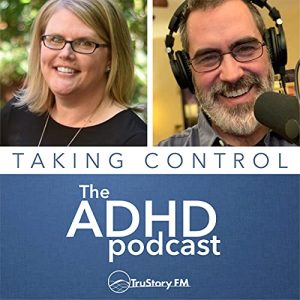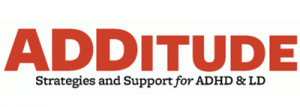Author: christina
ADDitude Mag – Q: “Fear of Failure Holds Me Back. How Do I Let Go of Past Mistakes?”
ADDitude Mag – When Perfectionism Stems from ADHD: Challenging the Fallacy of “Not Good Enough”
When Perfectionism Stems from ADHD: Challenging the Fallacy of “Not Good Enough”
“Perfectionism, when unhealthy, drives a person to exhaustion striving for a flawlessness that’s neither reasonable nor healthy. Though it may seem contradictory, perfectionist traits may stem from ADHD — an overcompensation for past errors or for feeling “not good enough.” Letting go of perfectionism does not mean eliminating worries around mistakes, failure, and judgment, but rather accepting that they are part of life — and one that can help us grow.”
Taking Control, The ADHD Podcast: Call Out Your Stinking Thinking! ADHD & Self-Compassion with Dr. Sharon Saline
Dr. Sharon Saline joins Nikki Kinzer and Pete Wright on Taking Control: The ADHD Podcast!
 “We’d never heard of the phrase stinking thinking until Sharon Saline used it with us on the show this week. But we knew what it meant immediately. We live with it. It’s the thinking we use about ourselves when we’re compromised or when our reserves of resiliency have been tapped, and when what we need more than anything else is just a little bit of self-compassion. But as ADHDers, finding self-compassion isn’t always natural. We have to make a practice of it, integrating the language and behaviors of compassion into our days and hours such that when we need it, it’s not so hard to find…” Listen to the episode below, or click here to listen at TakeControlADHD.com.
“We’d never heard of the phrase stinking thinking until Sharon Saline used it with us on the show this week. But we knew what it meant immediately. We live with it. It’s the thinking we use about ourselves when we’re compromised or when our reserves of resiliency have been tapped, and when what we need more than anything else is just a little bit of self-compassion. But as ADHDers, finding self-compassion isn’t always natural. We have to make a practice of it, integrating the language and behaviors of compassion into our days and hours such that when we need it, it’s not so hard to find…” Listen to the episode below, or click here to listen at TakeControlADHD.com.
Psychology Today: ADHD and Self-Awareness
How to improve metacognition and nurture resilience.
“Do you ever struggle with evaluating how you are doing in real-time and pivoting appropriately? Metacognition, also known as self-awareness, is a key executive functioning skill that coalesces in the late twenties for people with ADHD. It refers to processes related to understanding your thinking and thought processes to improve learning and performance. It’s a way to think about your thinking.” Read the full article by Dr. Saline!
ADDitude Free Download: The Eisenhower Matrix for ADHD Decision-Making
The Eisenhower Matrix for ADHD Decision-Making
The Eisenhower Matrix is a simple, effective decision-making tool for determining which tasks deserve our immediate action, our long-term attention, our delegation skills, and our circular bins.
What Is the Eisenhower Matrix?
“It’s human nature. When a fire sparks up, we drop everything to fight it. But in our ADHD lives, there are little fires everywhere. And we get so busy extinguishing flames sometimes that we can spend a whole day — maybe a week — spinning around and around in a mess of fire retardant. We’re exhausted but have nothing to show for our time or energy. If this sounds familiar, let me introduce you to the Eisenhower Matrix, a decision-making tool devised by the 34th President of the United States — a five-star general who accomplished a dizzying amount of important work in his two terms. Use the chart below to help determine which flare-ups could be delegated or ignored, and which ones actually deserve your precious attention.”
YourTango – The 5 Most Overlooked Symptoms Of Inattentive ADHD & How To Cope With Each
22 News Mass Appeal – Four ways to help manage a frustrated child
Intrepid Ed News – Improve your student’s study and work habits: Using my GRIT method
ADDitude Webinar Replay – Perfectionism and ADHD: Making ‘Good Enough’ Work for You
Access the recording of the ADDitude webinar by Dr. Saline on 1/19/22:
“Perfectionism and ADHD: Making ‘Good Enough’ Work for You”
Get access to the webinar replay! “In this webinar, Dr. Sharon Saline will explain how to stop setting unreasonable standards, engaging in negative comparisons to others, and criticizing yourself for living with ADHD. You will learn how to understand and manage the root causes of perfectionism, examine the role of imposter syndrome, decrease negative self-talk, and increase your capacity for personal compassion. You will understand how to improve executive functioning skills related to procrastination and productivity, stop reflexive shame, and create techniques for managing stress. With these resources, you’ll begin to nurture the essential resilience of a growth mindset and accept yourself as you truly are — perfectly imperfect.” In this free, hour-long webinar, you will learn to:
- Understand the relationship between anxiety, perfectionism, and ADHD
- Improve executive functioning skills related to procrastination and productivity
- Set realistic expectations based on previous successful experiences
- Develop techniques for addressing imposter syndrome, fear of failure, and shame
- Increase the capacity for mindful self-compassion and self-acceptance





